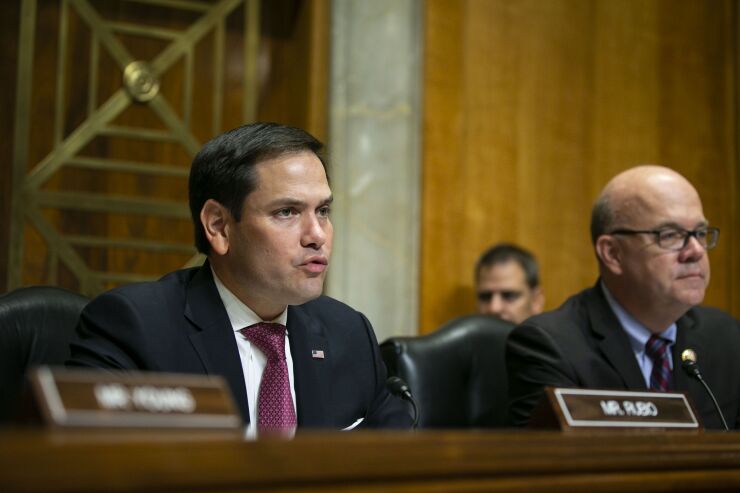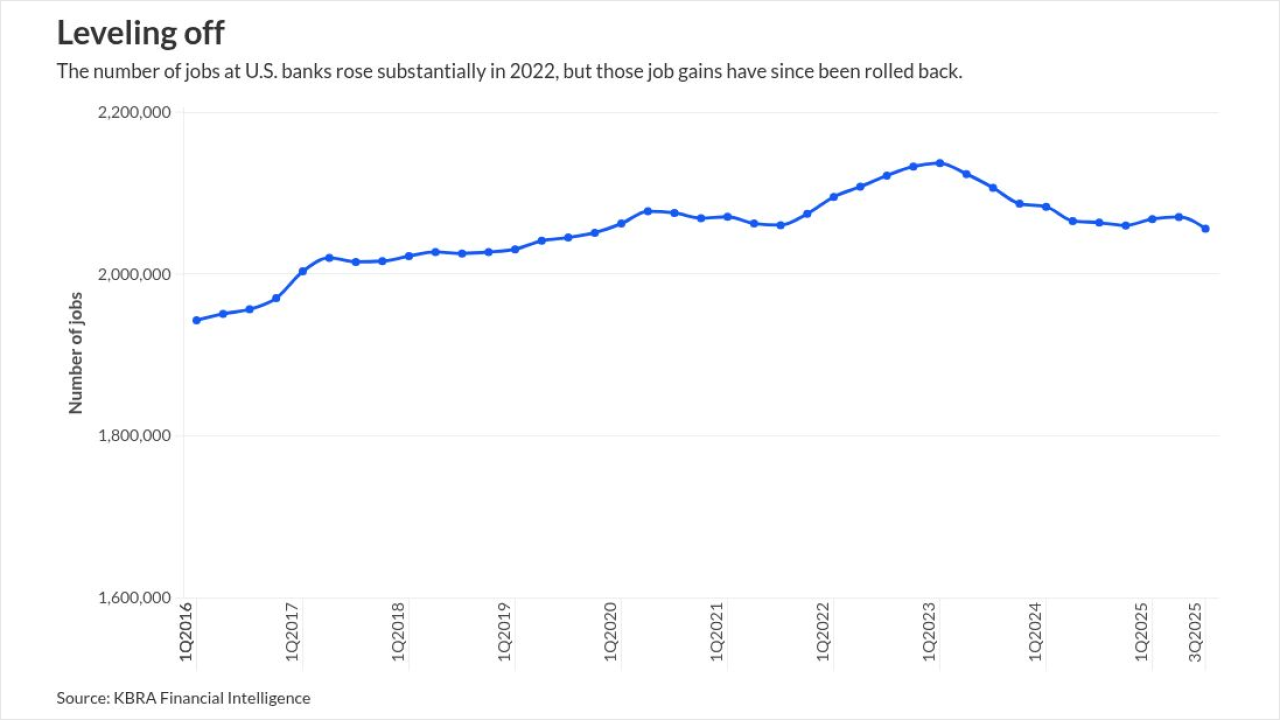Want unlimited access to top ideas and insights?
As lawmakers weigh competing small-business rescue plans, bankers are lining up behind Sen. Marco Rubio’s proposal to significantly boost funding authority for the Small Business Administration’s 7(a) loan program.
The bill drafted by Rubio, R-Fla., the chairman of the Senate Committee on Small Business and Entrepreneurship, would boost the program's authority from $30 billion to $80 billion, earmarking the money for businesses hit by the coronavirus crisis. Through March 6, a little more than six months into the government's 2020 fiscal year, lenders had made about $9 billion in 7(a) loans.
“We’re thrilled the government is stepping in,” said Jay Sidhu, chairman of the $11.5 billion-asset Customers Bancorp in Wyomissing, Pa. “Whether it’s a limousine service, restaurants or hotels and the like, people are staying home. Businesses need some help.”
The other proposal on Capitol Hill — a bill touted by Rep. Nydia Velazquez, D-N.Y., who chairs the House Small Business Committee — would trust the SBA to make loans directly, sidelining private-sector lenders.
Bankers prefer Rubio's plan, expressing a desire to have a direct role in the lending process, while sharing concerns that the SBA is ill-equipped to quickly put funds in the hands of needy businesses.

Guy Williams, president and CEO of the $1.8 billion-asset Guilf Coast Bank & Trust, said he fears the SBA lacks the necessary infrastructure to administer a direct loan program on the scale Velazquez envisages.
“It would take too long,” said Williams, whose 30-year tenure at Gulf Coast included guiding the bank through Hurricane Katrina and its aftermath in 2005. “People need money right now.”
Along with increased 7(a) funding, Rubio’s plan would — for one year — increase the guaranteed portion of regular 7(a) loans to 90%, and waive the upfront guarantee fee the agency charges and the annual fee borrowers pay while loans are outstanding. Borrowers would be authorized to use loan proceeds for payroll support, including payments for sick, medical or family leave.
Rubio’s proposal would also increase the maximum amount for streamlined Express loans from $350,000 to $1 million.
“The 90% guarantee will extend the range of borrowers we can lend to,” Williams said.
Under 7(a), the SBA backs loans made by banks, credit unions and other lenders. The maximum loan size is $5 million.
The Velazquez plan would offer 10-year, no-interest loans for as much as $2.5 million to small businesses impacted by coronavirus.
“Under this bill, small business owners will be able to finance payroll, employee benefits such as paid leave, and existing debt,” Velazquez said in a press release. “The stakes are too high for the federal government to get this wrong. This bill is an important step in what must be a swift, bold government response to protect our country’s people and small businesses.”
Read more:
But the SBA has drawn criticism in the past for slow processing times. While the agency approved more than 20,000 small-business disaster loans following Katrina, borrowers waited five months on average before they received a check, according to a Government Accountability Office review of SBA’s performance.
The agency has improved its disaster-lending efforts significantly since Katrina, but Williams fears a similar bottleneck if it has to mount a nationwide direct-lending effort.
“We’re already in business,” Williams said of existing 7(a) lenders. “We can implement it quickly.”
Chris Hurn, CEO at Fountainhead Commercial Capital in Lake Mary, Fla., a nondepository SBA lender, said the agency lacks the resources to make direct loans.
“They have such limited staff to put those direct loans out, that’s why they have to go to the private sector to try to push the 7(a) program,” Hurn said. “This will all be about how fast we can get capital out the door to save businesses, prevent them from doing layoffs or potentially even shutting their doors.”
Fountainhead has already received eight fully completed loan packages from prospective borrowers, Hurn said.
“That’s how serious people are taking this,” Hurn said. “It usually takes me weeks of follow-up to get a complete package on a submission. I’ve now got eight already waiting for me Monday morning when I get to the office.”
The Consumer Bankers Association called Rubio’s proposed bill a “thoughtful approach.”
“By utilizing the 7(a) Loan Program, the government can expeditiously distribute capital to struggling small businesses,” Richard Hunt, the association’s president and CEO, wrote Friday in a letter to Rubio and Sen. Ben Cardin, D-Md., the ranking member on the Senate’s Small Business Committee.
So far, the only authority Congress has given the SBA to respond to the coronavirus crisis has been funding to make $7 billion in disaster relief loans that was included in the $8.3 billion supplemental spending package President Trump signed on March 6. The SBA can offer economic injury disaster loans up to $2 million to affected small businesses, but only after the governor of their state submits a formal request.
As of Friday evening, no state had submitted a complete application, but an SBA representative said staff worked throughout the weekend to get the existing disaster relief program up and running, and to prepare for new legislation.
Separately, the agency reminded its 7(a) lending partners that they possess the authority to authorize a six-month deferment of loan payments for borrowers experiencing temporary cash-flow issues without agency consent. For loans sold on the secondary market, lenders can authorize a one-time 90-day deferment without prior investor consent.
The proposals by Rubio and Velazquez give SBA Administrator Jovita Carranza 15 days to publish guidance on how the programs would be administered. Hurn said he didn’t think businesses could wait that long.
“We really need to start underwriting these loans this week,” Hurn said.
While Congress decides on its next step, Sidhu said Customers is reaching out to its small business clients to inform them of SBA’s current disaster relief effort, as well as financing options the bank is offering on its own. Customers has committed to provide $200 million in small business loans.
“We realize the importance of supporting our customers in tough times,” Richard Ehst, Customers’ president and chief operating officer, said. “We’re not hunkering down.”





